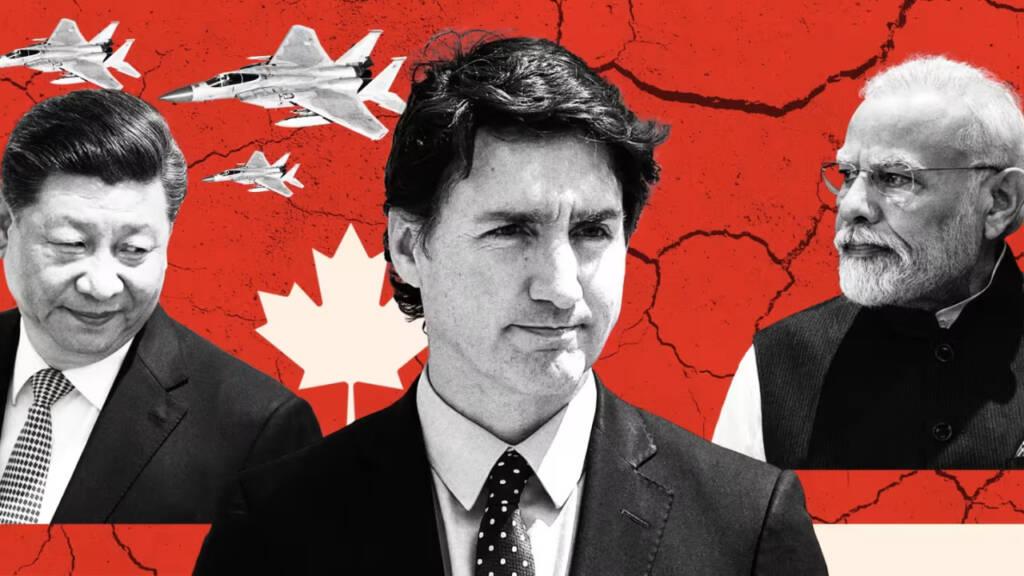Once perceived as a sheltered entity in geopolitics due to its geographical isolation, Canada is witnessing a shift in its stance. Traditionally viewed as a ‘fireproof house,’ shielded by oceans and a friendly neighbor in the US, the country’s identity was rooted in this perception. This self-image persisted despite active involvement in international conflicts, spanning from World War II to the Afghan war.
However, this sense of detachment from global complexities is dissipating rapidly. Canada is increasingly embroiled in precarious foreign policy challenges, testing its ability to reconcile its principles, strategic interests, and national identity. Notably, the nation finds itself entangled in tense relations with prominent nations like India and China—both burgeoning powers and among the most populous countries of the 21st century.
Over the past year alone, Canada has accused China of interfering in its domestic politics and criticised the Chinese military for flying dangerously close to its aircraft over the South China Sea.
A telling incident showcasing these shifts occurred when Chinese leader Xi Jinping rebuked Canada’s Prime Minister, Justin Trudeau, during the G20 summit in Bali. In a recorded exchange, Xi Jinping accused Trudeau of divulging private conversation contents, leaving Trudeau visibly taken aback.
Read More: Canada is going to lose the Artic forever
Most dramatically, Trudeau startled the global community by announcing an investigation into ‘credible allegations’ implicating the Indian government in the fatal shooting of a Canadian Sikh in Vancouver.
Highlighting these events, Canada’s Foreign Minister Mélanie Joly remarked on the evolving global landscape, stating that Canada’s geographic isolation, once a protective factor being surrounded by three oceans, can no longer be relied upon for safeguarding its interests.
Then comes the spat with India over the murder of Hardeep Singh Nijjar, a member of a separatist movement pushing for the creation of an independent Sikh state in India, is a stark example of how power relations are shifting in the world.
Join us on Telegram: https://t.me/tfiglobal
Recently, Canada encountered strained relations with India, leading to the withdrawal of 41 diplomats due to New Delhi’s threat of revoking their diplomatic immunity—an action perceived as violating established diplomatic norms.
Simultaneously, Canada’s engagement with China remains on the mends after a prolonged period of tension. In 2018, bilateral relations plummeted when China detained two Canadians—Michael Kovrig and Michael Spavor, known as the “two Michaels”—for over three years. Widely interpreted as retaliation for Canada’s detention of Meng Wanzhou, Huawei’s chief financial officer, at the behest of a US extradition request, this stalemate persisted until 2021. Their release came through an exchange following Meng’s deferred prosecution deal.
These instances highlight the complexities Canada faces in managing its foreign relations.
Canada also faces a potentially very turbulent situation on the horizon — the possible re-election of Trump, whose first term in the White House sparked a marked deterioration in relations between Canada and its closest ally. In interviews in Ottawa, multiple officials and foreign policy experts say Canada is fretting about the prospect of Trump.
So, if we take a look at how Geopolitics caught up with Canada, things actually seem grim. Most of it has to actually be attributed to Trudeau’s misdeeds.
Trudeau’s international diplomacy has been marred by several such contentious events. Canada’s failed bid for temporary UN Security Council membership in June 2020 garnered criticism, attributing Trudeau’s vague global stance and insufficient efforts to secure pivotal votes.
The Kadhimi Affair, exposing a $10 million payment to the World Sikh Organization without ministerial knowledge, sparked allegations of interference in India’s internal matters due to the group’s alleged support for Khalistani separatism. The $15 billion arms deal with Saudi Arabia in 2019 faced human rights activists’ backlash, fearing its role in Yemen’s turmoil. Then the two Michaels fiasco which resulted in deterioration of relations with China.
Read More: Can’t Blame China! Trudeau finds a new scapegoat in India for his personal slip ups
The USMCA trade deal and TPP withdrawal drew criticism for favoring the US excessively and undermining Canada’s economic prospects. Additionally, prolonged disputes over softwood lumber and imposition of tariffs on US imports further strained international relations. Also, Trudeau’s renegotiation of NAFTA into USMCA faced scrutiny for its similarities to its predecessor, prompting questions about the efficacy of Trudeau’s diplomatic decisions on the global stage.
These are just a few examples of instances where Trudeau has been criticized for his handling of international diplomacy. However, the allegations have raised questions about Trudeau’s judgment and his ability to represent Canada on the world stage.
Watch More:
https://youtu.be/XcUifVRywOQ?si=bGYgzCCVu-qXow3H
